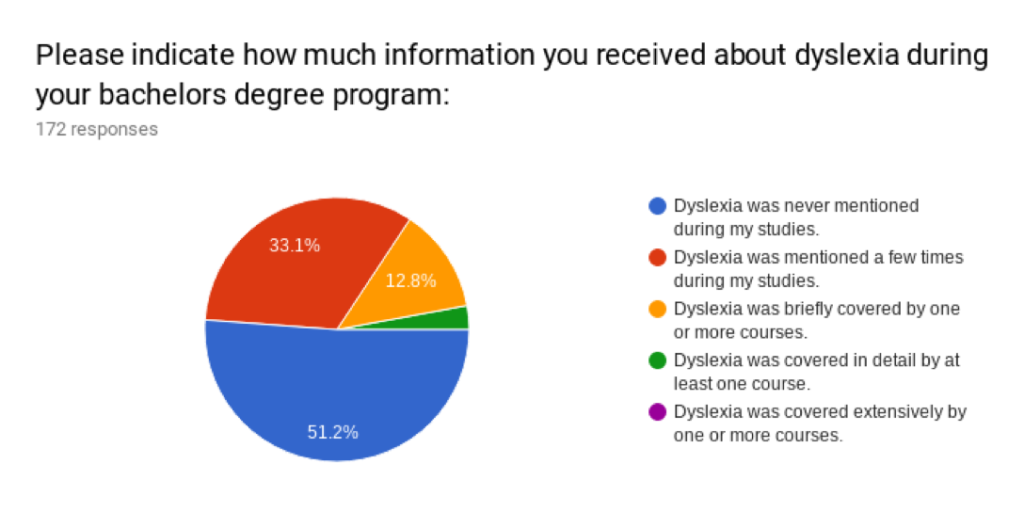
“It is the lack of teacher training that is the biggest barrier to literacy.”
Shirley Cramer Honorary Board Member,
Dyslexia International Co-editor, Learning Disabilities: Lifelong Issues
Dyslexia researchers worldwide agree that at least one in five of the population is dyslexic.[1] So, we can safely assume in a class of 30 learners, on average up to 6 struggling learners are dyslexic!
Why is a lack of dyslexia awareness devastating for dyslexics?
 As a language-based learning disability, dyslexia is more than just a difficulty to read. It is a cluster of symptoms, affecting individuals throughout their lives; it influences spelling, pronunciation, memory, social relations, coordination, sense of time, balance, causing low self-esteem, depression, directly linked to ADD and ADHD, and untreated can easily develop into a permanent academic learning disability in the typical instructional environment. [2]
As a language-based learning disability, dyslexia is more than just a difficulty to read. It is a cluster of symptoms, affecting individuals throughout their lives; it influences spelling, pronunciation, memory, social relations, coordination, sense of time, balance, causing low self-esteem, depression, directly linked to ADD and ADHD, and untreated can easily develop into a permanent academic learning disability in the typical instructional environment. [2]
Young learners and their parents are often unaware that they are dyslexic. They seem intellectually bright, have normal vision and hearing, have an impressive general knowledge on certain topics. They often view their reading/writing disadvantages as “I thought this is how the text looked like for all readers.” Most dyslexics go undiagnosed, some for their entire lives, but with very undesired outcomes.
Dyslexia changes from a Learning Difference to a Learning Disability when a child cannot learn in school due to inappropriate teaching methods and having become frustrated, exhausted, humiliated and despondent.
When a child loses their self-esteem and begins to believe they are “stupid” they are filled with “self-limiting beliefs”.
They shut down and can no longer learn many new skills in school in a normal and timely manner – if it all. Students with dyslexia can quickly fall into a spiral of failure.
When students with dyslexia remain undiagnosed throughout their school careers, labelled instead as lazy or disruptive, they face the misery of failure early in their lives. The long-term effects of dyslexia on young adults include school failure, depression and increased risk of suicide, delinquency and reoffending. Indeed, surveys show that amongst the high percentage of illiterate people in prison, a disproportionate number have dyslexia. [3]

In order for teachers to be able to help these students most effectively, it is vital that they understand what dyslexia is and implement the best-proven methods to help these students during a normal day in class where 80-90 percent of learners are non-dyslexic!
So, apart from unsatisfactory academic achievements, what happens with dyslexic learners when most teachers are unqualified to recognise a dyslexic child in their midst. The dyslexic children begin to see themselves as ‘abnormal’ and ‘stupid’, which is exactly what they are told, either openly by teachers or by their friends, or indirectly by being put on the ‘stupid’ table with the other ‘slow’ kids. Children identify the “clever” and “not-so-clever” ones are very fast, and no matter how teachers dress up mixed-ability classrooms, kids know! In the playground, the clever kids mix within their own circles, excluding all the others as misfits. It is in most cases not a question of alearning disability, but rather a teachingndisability.
Each year the dyslexic child falls even further behind their peers, and their common reaction is to give up even trying in class, as no matter how hard they try, they always seem to get the lowest marks. No matter how hard they revise spellings or facts, within minutes or hours such facts or spellings are lost like grains of sand… and often teachers are just satisfied by mislabelling pupils as troublemakers and try to move such needy pupils to a different teacher.
If individual equality and societal success are to be achieved, students of all nationalities and walks of life must have access to teachers who are trained to recognize and address learning difficulties such as dyslexia.
(–end quote)
CONCUSION: What is needed in South Africa to make that happen?
The official status of formal teachers training in dyslexia in South Africa is not clear (perhaps someone can help us out on this issue), but from about 30 years experience as a parent of dyslexic children, ….. I can with confidence state that the majority of teachers of all school grades are not formally trained to identify dyslexia in learners, not to mention how to assist them to become fully fledged learners.Let us start at home: what do we as parents of (suspected) dyslexic children know about the subject? How aware are we of how well our children are doing, and what their full academic potential are? What is our reaction when the comments on the end of year report are: “Work harder”; “Put in some more effort” “I know you can” “Apply yourself” …on top of the devastating: “Failed!”
And a request to teachers: Please spare a few minutes of your precious and well deserved holiday to learn what you can about dyslexia. Read this webpage www.dyslexiasolutions.co.za, and Google as many articles on dyslexia as you can.
Till next time!
